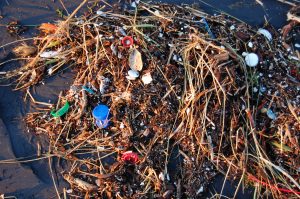Whether you roll out of bed and slap on whatever you can find laying around, or are a regular attendee of Shopaholics Anonymous, you at one point wear and wash your clothing. Did you know however, that washing your clothes is actually doing more harm than good?

Early Electric Washing Machines
Published under the Creative Commons License; photo courtesy of a Wikimedia User
The Problem
For centuries, people have been washing their clothes to rid them of the foul odours and bacteria build up; with the invention of the electric washing machine in the early twentieth century, washing clothes has since become a common household chore. However, what the masses neglect to realize with every load of laundry they do, is the fact that millions of tiny fibres, known as microplastics, are released into the water ways, which, eventually find their way to the ocean.
Many recent studies have been targeted at investigating the exact amounts of microplastics released each time a load of laundry is washed. One such study showed that an average 13-pound load of laundry can release five-hundred thousand fibres from polyester and close to one million from acrylic-based clothing. The numbers are shocking.

Ocean Plastic Pollution Published under the Creative Commons License; photo courtesy of Wikimedia User Kevin Krejci
In fact, one of the worst culprits in polluting the World’s Oceans is the water-repellent raincoat. Chances are, most people have at least one rain jacket hanging in their closet. These jackets are made up of special microplastics known as Perfluorinated Chemicals, or PFCs. They give the raincoat its waterproofing properties but are shed when washed. Once in the oceans, they do not break down. These fibres, which are not visible to the human eye, pose massive threats to, and have adverse effects on marine life. Studies have shown that fish are particularly prone to the effects of microplastics. When they ingest microplastics, it is not passed out as waste. Therefore, they accumulate. Consequently, their digestion is affected, and many organisms do not survive to the age where they can reproduce, destroying entire ecosystems.
The video below shows the the rising threat of such a problem and highlights that immediate action needs to be taken.

Video from: https://www.youtube.com/watch?v=ZHCgA-n5wRw
What can we do to help?
A practical solution that we can implement in our own lives is making changes to our shopping and washing habits. For instance, instead of buying many cheap basics loaded with synthetic fibres with the expectation that they last a year and then are dumped away, it is better to buy a few quality items that are not composed of as many synthetic fibres. Furthermore, as oppose to washing clothes on a daily basis or in high frequency, it is better to wash them less regularly. Lastly, we can take it upon ourselves to hand wash out clothes and then instead of throwing the water down the drain, where it will end up in the oceans, perhaps use the waste water to water the garden or other agriculture. Simple solutions like this can prevent the shedding of massive amounts of synthetic fibres into the ocean, and reduce the risks faced by marine life.
By: Wesley Louie



